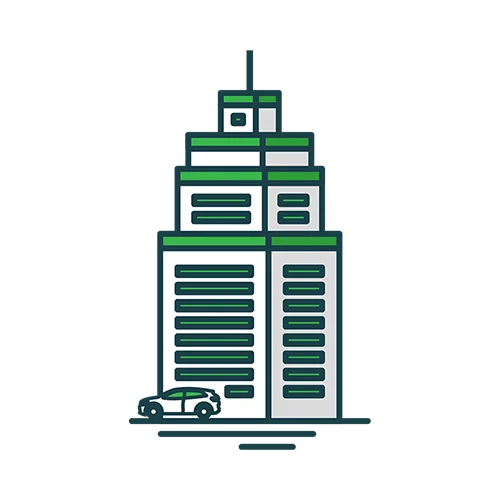Commercial property insurance protects the physical space you work out of and includes insurance for your business content and equipment in the event of theft, vandalism, fire, or any other covered peril. It’s one of the most essential elements of business insurance that almost every owner needs.
One of the biggest areas of confusion around commercial property insurance includes small business owners who work out of their own homes. Because you’re already paying for homeowners or renters insurance coverage, you don’t need to pay for additional commercial property coverage on your own home, right?
Not necessarily. While a conventional homeowners policy may include some level of coverage for your small business, there are some specific scenarios that may be expressly excluded from coverage.
If you store expensive equipment or inventory in your home, your personal homeowners coverage likely limits the maximum claim you can file after a loss. Some homeowners policies will deny a claim for business inventory or equipment damaged in your home if you haven’t previously disclosed it. Let’s take a closer look at what is and isn’t covered by commercial property insurance.
What Does Commercial Property Insurance Cover?
Commercial property insurance is designed to cover every aspect that’s essential to your daily business operations, including losses to your building, your business’ personal property, equipment, inventory, and any other physical assets of value or deemed necessary by the business. So that means the exterior property structures, landscaping, signage, and fencing should all be covered as well.
It’s important to recognize that the specific elements of your commercial property insurance will fluctuate from policy to policy, but that your coverage should be tailored to the region your business operates out of.
In the same way that a homeowner in Florida wouldn’t need the same coverage as a homeowner in California, businesses should tailor their coverage to the types of loss most common to their location.
The most common protections your business has against loss or damages resulting from severe or natural disasters, such as blizzards, hurricanes, and tornadoes. It also should cover theft, vandalism, and sudden or unexpected disasters like fire or water damage.
Here are some common examples of business content & equipment that are also included under the protection of your business property insurance:
- All technology equipment, including computers, printers, and point-of-sale devices
- All your standard furniture and equipment, including desks, chairs, and display cases
- All inventory stored on location for your business
- All interior and exterior signage and marketing materials
- Sensitive documentation stored on-site for your business
- All external fences, landscaping, and foliage
As you can see, commercial property coverage is about so much more than physical property. Even if you’re only renting your space, or if you work from home, it protects all the tangible aspects of your business from covered perils.
What Isn’t Covered By Commercial Property Insurance?
Your commercial property insurance won’t cover every legal risk to your business, and some things may be excluded from coverage. The exact details of your policy may be different, but losses typically excluded by commercial property insurance include:
- Damage or theft to vehicles used for business purposes, even if they’re stored at or within the business property (including warehouses)
- Money stored on-site at your business location that may get stolen or damaged.
- Loss to the physical land (including plants and other foliage) where your business is located
You may have to invest in some additional insurance coverages for your business to ensure you’re protected from the aforementioned details. Let’s take a look at some additional coverages you may want to look into.
Types of Commercial Property Insurance Coverage
You can get basic commercial property insurance, but it won’t cover you completely. There are separate coverages that you may need to be purchased as endorsements, or separate policies altogether, that go hand-in-hand with your commercial property insurance coverage.
Not unlike your homeowners insurance, flood and earthquake damage are typically excluded from basic commercial plans, in addition to internal theft (by an employee), loss of company vehicles, equipment malfunctions, defects in your product, and other environmental damages.
Here are a few other types of business insurance you may want to invest in:
- Business Interruption Insurance: If your company needs to relocate or conduct major repairs after damage from a covered loss, business interruption coverage will compensate you for lost profits, payroll expenses, mortgage, rent, and more while you rebuild or repair. It’s typically an add-on on commercial property insurance policies.
- Commercial Auto Insurance: If you have or rely on company vehicles, they require an entirely separate policy from your property insurance. This is especially crucial if you employ team members who spend time on the road.
- Business Liability Insurance: This includes protection for your employees in case they’re ever hurt or face losses on your business property, in addition to coverage against internal theft or damages.
- Equipment Breakdown Insurance: Your commercial property damage only covers equipment damaged from external forces (like a fire or vandalism). If you have expensive equipment in your office, you may want to consider additional protection for operator errors or internal damage like a power surge.
- Business owners policy (BOP): A business owners policy is a common insurance package for businesses. It includes property, equipment breakdown, and liability insurance. It’s a great starting point for small or growing businesses.
- Flood Insurance: This may simply be an add-on to your commercial property insurance, but it’s a very important consideration if you live in an area prone to strong weather systems or flooding. Commercial property insurance policies protect you from many forms of damage, but flooding is not one of them. You’d need a separate policy (or add-on) to be covered.
- Errors and Omissions Insurance: Also referred to as E&O insurance, this coverage can protect your business from legal expenses if someone sues you because they’re unhappy with your product or service.
Average Commercial Property Insurance Rates
Small businesses can pay between $500 to $2,000 per year for commercial property insurance. But, a blanket average number is hard to generate because the cost of commercial property insurance coverage depends on many factors, including how big your building is, how much equipment you have, the location of your company, and more.
For instance, if your business is located in a high-crime area or a place prone to severe weather, you may pay more for insurance. If you have a lot of security or if your structure is a newer building, this could reflect favorably on your commercial property insurance rates.
Generally, the bigger and more valuable the business, the more it will cost to insure. Plus, it depends on what coverages you opt for and how you want to cover your equipment (replacement cost or actual cash value).
It’s also important to recognize when other types of business insurance are necessary. If you have employees, a company vehicle, expensive equipment, or work in a flood zone, your business property insurance may not be enough to fully protect your company.
Commercial Property Insurance Companies
Insurance companies generally fall into two categories: standard or surplus carriers. Standard insurance companies follow more state regulations and pay into a state fund to have access to reserve money for claims in case of an ultimate disaster.
These regulations sometimes prohibit companies from taking on financial risks that are deemed too large or dangerous. This is good for the financial solvency of the company, but, this could also mean that some hard-to-insure companies aren’t always eligible for standard coverage because they’re simply too risky. This is where companies called surplus lines insurers come in.
Surplus lines insurers are still authorized to write policies, they just don’t pay into a state reserve fund. They may be based outside of the state you’re looking for insurance in or they may be based internationally. Either way, they’re sometimes allowed to take on higher risks than some standard insurance companies. If your business is extremely high-value, or for some reason particularly hard-to-insure, you may have to turn to a surplus lines company.
When looking for a commercial property insurance policy, you want to find a company that offers exactly what you need. Good customer service and potential discounts are essential. Many major well-known providers offer commercial property insurance coverage, but bigger doesn’t always mean better. Sometimes, it may be worth it to find a smaller, specialized carrier who focuses on lines of commercial insurance specifically. Do your research.
Remember that commercial property insurance can be written as a standalone policy or packaged into other business policies, such as a BOP. Be aware of what a provider offers and their exclusions and policy conditions.
The editorial content on Clovered’s website is meant to be informational material and should not be considered legal advice.

